2008
|
European Day of Languages 2008: language treasures
|
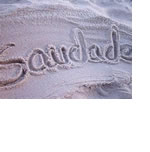 |
The Day proved more popular than ever. Major media initiatives were organised in several European countries around the theme of the Day with more events recorded in the EDL database of activities by 26 September than in any other year to date.
- in total 618 events from 44 countries in Europe and worldwide were registered on the EDL database for 2008 (almost 100 events were registered each from Austria and the United Kingdom and 50 from France, 40 the Czech Republic, 40 Lithuania, 40 Romania, 30 Germany, 30 Portugal);
- 2/3 of all events were targeted (among others) at children, pupils or students, and 1/3 (among others) at language teachers;
- 77,000 posters, 40,000 sheets of "Talk to me" stickers and 40,000 buttons were sent out to activity organisers, as well as proposals for 2009 and beyond.
Favourite word
In the EDL "language treasures" database the Portuguese word "saudade" topped the polls for 2008.
The idea of the database, which was set up in 2006, is to compile a list of words from different languages which no translation can do justice to. "Saudade" was submitted more often than any other word to the database in 2008. In Portuguese it (roughly!) expresses a feeling of missing and longing for something or someone.
Of course, if you have another "untranslatable" word, which you prefer, the database is still open....
EDL website - "Language treasures"
Statement of the Council of Europe Secretary General Terry Davis
|
2007
|
European Day of Languages 2007: buttons
|
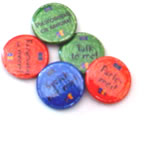 |
The celebration of the European day of Languages (EDL) has become a regular activity in many hundreds of schools which set up original projects and contribute to awareness raising and respect for other languages and cultures.
In 2007, 37 countries celebrated the EDL and 643 events were registered in the dedicated website (www.coe.int/EDL) which contains a database offering information on each activity.
Once again, the Council of Europe provided promotional material to National Relays with a view to promoting wide dissemination to mark the Day: posters, stickers, but also buttons specially produced by the ECML. Moreover, many schools, associations and even universities contacted the two Council of Europe co-ordinating instances (the ECML and the Language Policy Division) directly.
The official Council of Europe Press Release (English and French) was translated into 6 further languages thanks to National Relays: Albanian / Bosnian / Hungarian / Lithuanian / Swedish / Turkish.
New forms of celebrations took place, in particular international activities and celebrations by twin cities. The Council of Europe was associated with the celebration of the Day at the "Third Forum of Young People from the World" in Toulouse. The European Commission was actively involved in the celebration of the EDL and supported national initiatives.
|
2006
|
European Day of Languages 2006: balloons and a video
|
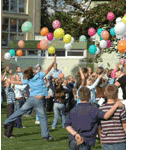 |
In 2006 the Council of Europe celebrated the sixth European Day of Languages (EDL). The Strasbourg-based Organisation’s message for EDL was issued in a press release which a number of member states translated into their official languages. The EDL website featured examples of interesting and original events held to celebrate the Day. These varied from a multilingual story-telling marathon in Brussels, a board game evening in 10 language cafés across Europe and a language label competition in Ireland. The site also featured a contribution from the Norwegian EDL relay, a video based on the theme "Talk to me".
By the end of September, details on close to five hundred activities across Europe had been submitted in the EDL database. It was of note that a number of organisers gave African languages a special focus as a tribute to the Year of African Languages 2006. After the Day, photos, reports, presentations and scanned news clippings were forwarded to the Council of Europe. All the sent materials were put together and now form the 2006 EDL photo gallery.
As a special gesture towards its host town, the ECML organised, with the assistance of the Austrian Association for the ECML, an EDL balloon marathon together with six schools in Graz. On 26 September, more than 800 different coloured balloons featuring the EDL "Talk to me" speech bubble in the 39 national languages of the member states of the Council of Europe were let loose above the skies of Graz. Some of the balloons crossed the Carinthian alps and postcards were returned from a distance of close to 200 km away. In November, representatives of the six schools visited the ECML. The pupils whose postcard travelled the furthest from Graz received a Council of Europe watch as a prize from Adrian Butler, the Executive Director of the ECML.
|
2005
|
European Day of Languages 2005: a press release x 12 and a game
|
 |
To mark the occasion of the 5th European Day of Languages , the Council of Europe issued a press release which was published in 12 languages thanks to the co-operation of national EDL Relay Persons. In addition, the Council of Europe published an article on the richness of the European linguistic heritage. The article maintains that acquiring languages is easier than you might think.
The EDL event database recorded details of 731 events from 36 European countries and Japan. Photos from a number of these events can be seen in the 2005 EDL photo gallery. The EDL website was also enriched by a new interactive game. With the help of the "Talk to me" stickers, the game prompts players to guess the origin of the 41 official languages of the Council of Europe's member states. 15 players who successfully identified the 41 languages received a special "Talk to me" T-shirt.
|
2004
|
European Day of Languages 2004: electronic greeting cards
|
 |
Although the EDL event fell on a Sunday in 2004, people organised events throughout the week prior to or following 26 September. Over 500 activities were registered in the EDL events calendar - the majority organised by schools - and more than 27 000 visits to the EDL website were recorded during the month of September. A picture gallery and reports of events organised to celebrate the Day were subsequently included on the EDL website.
The ECML and the Language Policy Division distributed thousands of stickers and posters mainly to the national EDL relays in the participating states. The EDL quiz which had been introduced in 2003 again attracted a large amount of interest (and was translated into Czech). A new electronic greeting card based on the EDL poster also proved very popular.
|
2003
|
European Day of Languages 2003: stickers, slogans and a quiz
|
 |
On the occassion of European Day of Languages 2003, Walter Schwimmer, Secretary General of the Council of Europe said "Language learning is an excellent way to spread tolerance and mutual understanding between peoples. Linguistic diversity is a reality and is one of Europe 's strengths. It is part of our cultural heritage and our identity".
Some 650 events were registered in the EDL online events calendar. Moreover, an EDL slogan competition for the year 2004 was organised. The winner of the competition won a trip to Graz. The winning entry, according to the votes cast online was:
PACK AN EXTRA LANGUAGE IN YOUR LUGGAGE.
METTEZ UNE LANGUE DE PLUS DANS VOS BAGAGES.
METTI UNA LINGUA IN PIù NELLA VALIGIA.
For the purpose of the EDL 2003 celebrations, new
"Talk to Me" stickers were launched. The stickers can be downloaded in 41 official languages of the Council of Europe's members states. To continue the celebration of the European Day of Languages throughout the year, an interactive quiz was introduced on the EDL website. The quiz is divided up into 6 thematic areas and constitutes a good tool for testing one's knowledge about the languages of our continent!
|
2002
|
European Day of Languages 2002: Euronews, the EDL database
|
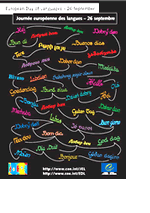 |
"Lifelong language learning" marked the central theme adopted for the second EDL celebrations. In his statement, Mr Walter Schwimmer, the Secretary General of the Council of Europe, encouraged the use of the internet in language learning and stressed how speaking another person's language was a "move towards this person, a way of removing barriers and fears among citizens". Also a short news item on the Day filmed at the Council of Europe's Headquarters was repeatedly shown on the Euronews channel on the evening of 26 September. A number of TV and radio stations held interviews with staff members with several using the recording produced for the EDL 2001 consisting of "Hello" in many languages.
The Council of Europe also produced a poster with "Hello" in the 40 official/national languages of the member states. An electronic version of the poster was made available on the EDL website. A leaflet with basic information on the European Day of Languages was produced in Strasbourg and sent to all EDL Relays for translation/adaptation and production in national languages.
The Council of Europe developed a new website dedicated to the EDL. The central feature of this new site was an interactive database for the registration of events. Although just shortly in operation, the interactive EDL database gathered over 400 events from 44 participating countries in 2002.
|
2001
|
European Year of Languages 2001: when everything begins...
|
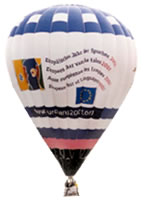 |
In 2001 the first European Day of Languages was one of the highlights of the European Year of Languages. According to the Council of Europe's Evaluation Report of the EDL, seminars and meetings on language policy (77%), festivals/fairs (73%) and exhibitions (67%) accounted for the most popular type of EDL event. Support from a prominent personality or institution was mobilised in 63% of the 45 countries concerned. In almost all countries, EDL-related press releases were published (87%) and the electronic media coverage amounted to 90%. For further details refer also to the "Examples of good practice" section of the EDL Evaluation report.
On the occasion of the Day, the Council of Europe launched an interactive game "Learn to say hello in other languages!", which met a major success.
|